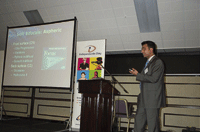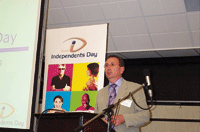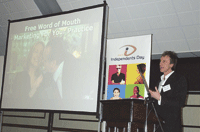Simon Frankiewicz reports from the latest addition to the CET conference circuit
Proven Track Record hosted its first 'Independents Day' at the National Motorcycle Museum in Birmingham on July 4. This aptly titled CET event aimed at the optometric independent sector attracted more than 100 delegates from across the UK who braved heavy rain and heavy traffic to attend the lectures predominantly on the subject of presbyopia.
The organisers had taken the novel approach of sending the delegates 'expectation questionnaires' before the event to establish their desired outcomes for the day, the results of which were used to set the learning objectives.
Nick Atkins opened the meeting with a reminder that although the independent sector is the largest in the optical industry, there needs to be an
ethos of 'inter-dependence' in order to stay successful in the future. He reminded the delegates that life had never been so good for the 'baby-boomer' generation and to maximise the opportunity they presented to us, we must try to 'enter the eyes and minds' of presbyopes.
The first presentation was by Andrew Clark, an optometrist and professional speaker who, by drawing on personal experiences, described the four steps to success, which are equally applicable to one's personal or business life. The first such step is to spot an opportunity, and he suggested that one of the most effective ways of doing this is to ask our patients what they want from us, rather than assuming that we are already delivering it.
Dr Fiona Fylan, a chartered health psychologist whose speciality is advising healthcare professionals on the psychology of their clients, gave a thought-provoking insight into the changes presbyopia may have on an individual's self image. She explained the stages a person goes through when coming to terms with a change in their perceived self-identity, and suggested positive ways to avoid reading glasses being seen as an 'instant ageing tool'.
THE 'VIAGRA GENERATION'
 |
| Dr Trusit Dave: with careful patient selection and imaginitive lens choice, it is possible to achieve a high level of patient satisfaction |
Professor David Thomson, the cause of the traffic-induced rescheduling, arrived fashionably late but was certainly worth the wait. Using a series of computer simulations, he gave a characteristically entertaining lecture demonstrating the anatomical and functional changes to the visual system in the older person. He explained the demographics of the ageing population in the UK and the impact this will have on the shape of our industry; a newly qualified optometrist is likely to spend 75 per cent of their time testing over 65s.
Professor Mo Jalie was next to the podium, with an absorbing presentation on the history of progressive lens design and how the effects of prescription and reading addition on lens performance can be controlled with new surfacing techniques. He described both the optical advantages of the latest generation 'dual-surface' progressive lens designs, and subsequent improvement to vision.
The dreaded post-lunch slot was filled by Brian Tompkins, who rose to the challenge with a typically flamboyant, provocative and highly amusing presentation on ways to maximise the opportunities presented by the presbyopic patient. Using several examples, he showed that many modern presbyopes are prime candidates for multifocal contact lenses, which are both profitable and rewarding to fit, particularly if wearers are properly educated as to the future changes in their condition.
 |
| David Goad: managing the patient database for optimum profitability |
Next up was Sarah Morgan who gave a captivating lecture on ways of communicating with presbyopes, highlighting the importance of demonstrating the different forms of correction and explaining any recommendations. She demonstrated how, by building a good rapport with a patient, it is possible to tailor our advice to their personal circumstances, and that this process starts with the front-line staff.
David Goad presented the audience with a number of innovative ways in which to manage a patient database effectively, thus enabling certain groups to be targeted with demographic-specific marketing material. Ensuring that design of the practice and choice of stock are attractive to the local patient mix and not making judgements about an individual's ability to buy a particular product were shown to be effective ways of maximising profitability.
SERVICE CHANGES
To end the day, Nick Atkins returned to the stage to suggest new ways of charging for optometric services, in order to ensure that patients are paying for our professional skills at the point of delivery, thus eradicating the need to charge higher prices for our products. Using a case study, he demonstrated not only how this can work efficiently, but perhaps more importantly, how this is likely to become more of a consideration following the recent amendment to the regulations governing contact lens supply in the Opticians Act.
 |
| Brian Tompkins: Many modern presbyopes are prime candidates for multifocal contact lenses |
The array of speakers and light-hearted approach to the subject of presbyopia made for a thoroughly enjoyable day, and I look forward to celebrating Independents Day again in 2006. Now where did I put my reading specs...?
